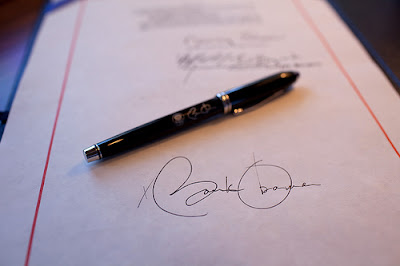In an October, 2008 debate against John McCain, Barack Obama said that health care "should be a right for every American."
In rights parlance, his assertion is one of a "positive right" meaning that others may be compelled to provide a person's health care. This is distinguished from essentially every right laid out for Americans in our Constitution: these are "negative rights," meaning that they proscribe others from inhibiting you from exercising your right but do not otherwise require active cooperation of others. Your right to free speech does not require others to help you breathe; it simply requires them to leave you alone (except in a few very specific circumstances where your speech is likely to cause imminent harm to others, thus infringing on their negative right not to be killed, beaten, or robbed).
On the other hand, if health care is a right, that means that an American who for whatever reason does not have access to a doctor must be provided that access, whether that means redistributing taxpayer money to the would-be patient or even the potential of forcing a doctor to provide his services in an area "underserved" by health care professionals.
The problem with Obama's positive right formulation -- as with all positive rights -- is that one never knows where such a right ends, if or when such a right might be curtailed when it conflicts with citizens' other (usually negative) rights.
Read the rest here.
Our generation has forgotten that the system of private property is the most important guaranty of freedom. It is only because the control of the means of production is divided among many people acting independently that we as individuals can decide what to do with ourselves. When all the means of production are vested in a single hand, whether it be nominally that of "society" as a whole or that of a dictator, whoever exercises this control has complete power over us. In the hands of private individuals, what is called economic power can be an instrument of coercion, but it is never control over the whole life of a person. But when economic power is centralized as an instrument of political power it creates a degree of dependence scarcely distinguishable from slavery. It has been well said that, in a country where the sole employer is the state, opposition means death by slow starvation.
Individual freedom cannot be reconciled with the supremacy of one single purpose to which the whole of society is permanently subordinated. To a limited extent we ourselves experience this fact in wartime, when subordination of almost everything to the immediate and pressing need is the price at which we preserve our freedom in the long run. The fashionable phrases about doing for the purposes of peace what we have learned.to do for the purposes of war are completely misleading, for it is sensible temporarily to sacrifice freedom in order to make it more secure in the future, but it is quite a different thing to sacrifice liberty permanently in the interests of a planned economy.
To those who have watched the transition from socialism to fascism at close quarters, the connection between the two systems is obvious. The realization of the socialist program means the destruction of freedom. Democratic socialism, the great utopia of the last few generations, is simply not achievable.
--from The Road to Serfdom, F.A. Hayek
---------------------------------------------------
Central planning, by definition, is coercion. There are always elements in society who are displeased and inconvenienced by the change for "the greater good". Doctors are forced to take whatever the government will pay (can be nothing at all), and cannot adjust rates based on their fixed costs such as equipment and staff salaries. There are taxpayers that don't have any interest to lose more of their income to support elements of society that are strangers to them, unproductive, and perhaps even illegally in this country. They are coerced to give up more of their earned wealth because of someone else's "right to healthcare."











